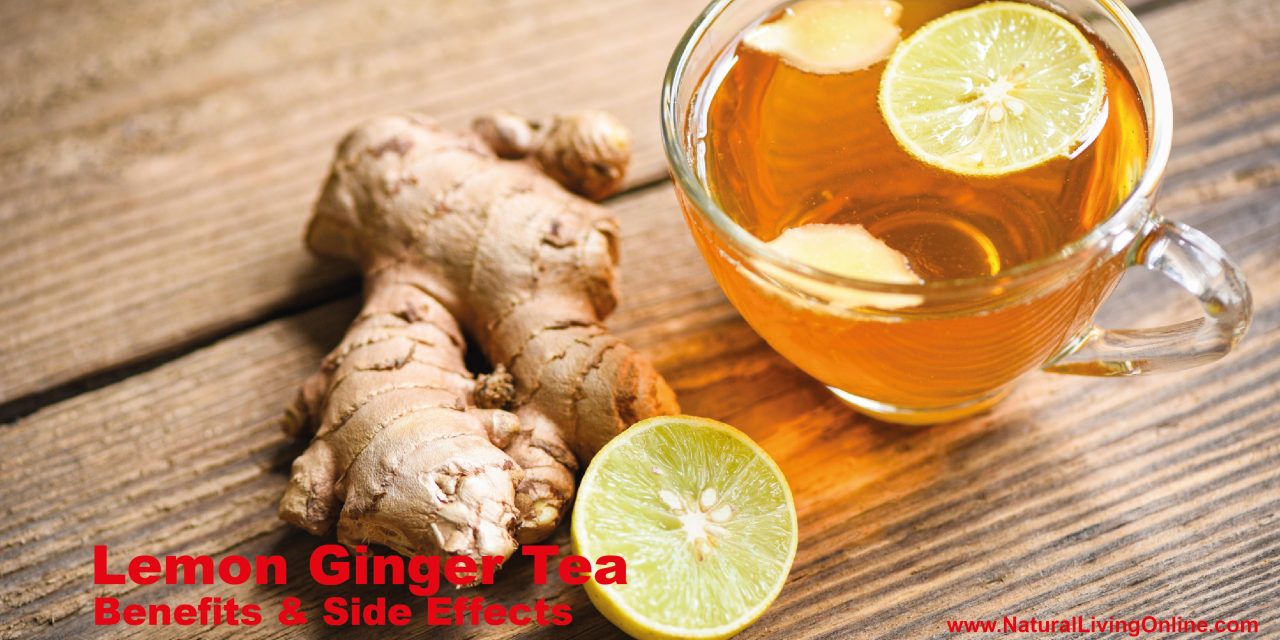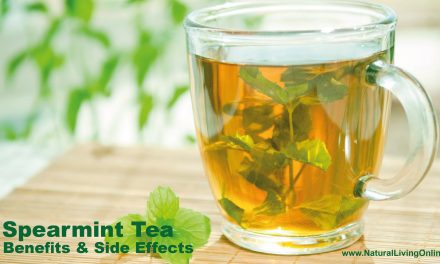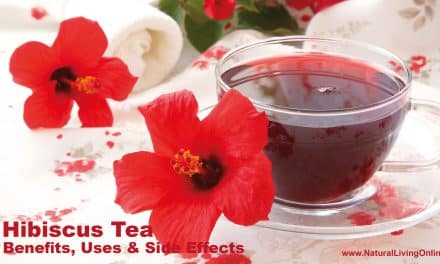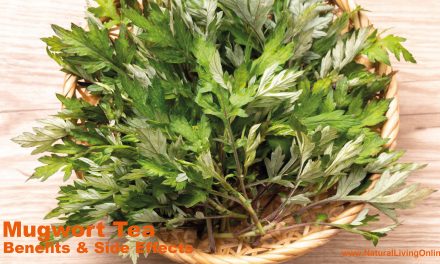Lemon ginger tea is more than just a warm, comforting drink; it offers numerous health benefits. Drinking lemon ginger tea can help improve digestion, reduce nausea, and boost immunity. People often turn to this beverage for its soothing properties and potential to aid in various health issues.
While enjoying the benefits of lemon ginger tea, it’s important to be aware of its possible side effects. Some individuals may experience mild symptoms such as heartburn or stomach upset after drinking it. Knowing these risks can help you make informed decisions about incorporating this tea into your daily routine.
Key Takeaways
- Lemon ginger tea can aid digestion and boost immunity.
- Potential side effects include heartburn and stomach upset.
- Understanding the benefits and risks helps with informed use.
Exploring the Nutritional Profile of Lemon Ginger Tea
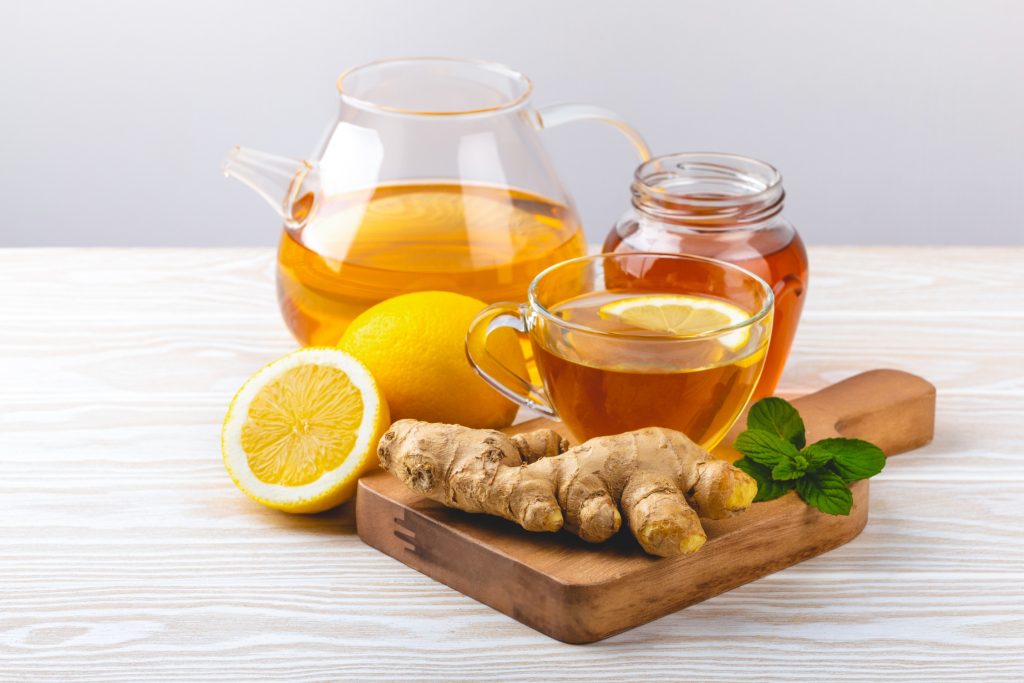
Lemon ginger tea combines the benefits of both ginger and lemon, offering a range of nutrients in each serving.
Ginger:
Ginger root provides several important nutrients, including vitamins B6 and C, magnesium, manganese, and trace minerals. Ginger also contains antioxidants like gingerols, which help combat oxidative stress.
Lemon is rich in vitamin C, a powerful antioxidant known for supporting the immune system. Additionally, lemon contains small amounts of potassium and calcium, which are important for maintaining health.
Vitamins and Minerals:
| Nutrient | Amount (per 8 oz serving) |
|---|---|
| Vitamin C | 10-15 mg |
| Potassium | 50-60 mg |
| Magnesium | 5-10 mg |
| Calcium | 10-15 mg |
Drinking lemon ginger tea can provide a mild intake of these nutrients. The combination of ginger and lemon brings a unique set of compounds such as antioxidants that can enhance well-being.
Antioxidants:
Lemon ginger tea contains various antioxidants, including flavonoids found in lemon and gingerols from ginger. These compounds help reduce oxidative stress, which can have numerous health benefits.
Preparation Tips:
To maximize the nutritional benefits:
- Use fresh ginger slices and fresh lemon juice.
- Steep for 5-10 minutes.
- Add honey if desired for sweetness.
For a daily boost of vitamins and minerals, consider drinking a cup of lemon ginger tea regularly.
Health Benefits of Lemon Ginger Tea
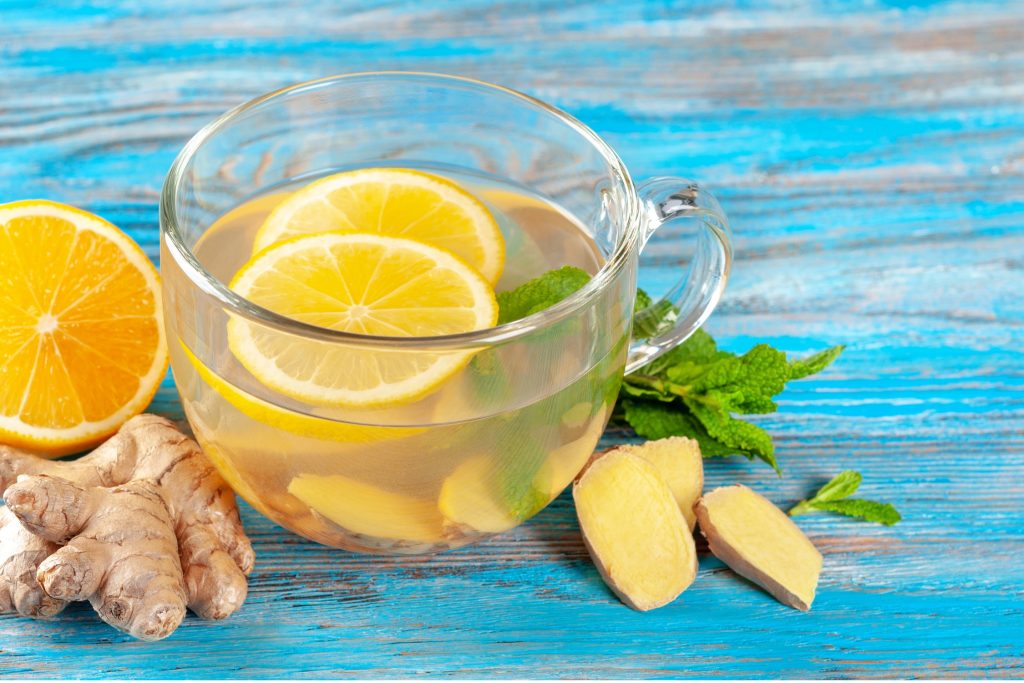
Lemon ginger tea offers a variety of health benefits, ranging from improved digestion and enhanced immune function to support for weight management and cardiovascular health. This flavorful tea also promotes healthy skin and hair, thanks to its rich antioxidant and anti-inflammatory properties.
Digestive Health
Lemon ginger tea supports digestive health by reducing bloating and indigestion. Gingerol, a compound in ginger, is known to relieve nausea and vomiting, making the tea useful for those experiencing morning sickness or chemotherapy side effects. Lemon provides pectin, a type of fiber that aids in promoting gut health. Drinking the tea can also help relieve constipation and improve overall digestive function.
Immune System Support
The immune system benefits greatly from the antioxidants and vitamin C found in lemon ginger tea. Vitamin C boosts immunity by aiding the production of white blood cells, essential for fighting off infections. The anti-inflammatory properties of ginger help reduce oxidative stress and inflammation, which can weaken the immune system. Regular consumption of this tea can thus fortify the body’s natural defenses.
Weight Management and Metabolism
Lemon ginger tea can be a helpful tool for weight management and boosting metabolism. Gingerol enhances thermogenesis, the process of heat production in the body, which can help burn more calories. Lemon provides pectin, which can help reduce appetite and increase feelings of fullness. Together, these ingredients can aid in weight loss and improve metabolic rate, making it easier to maintain a healthy weight.
Cardiovascular and Blood Health
This tea supports cardiovascular health by regulating blood pressure and improving blood circulation. Lemon offers potassium, an essential mineral for heart health. Gingerol has anti-inflammatory properties that help prevent blood clots, reducing the risk of stroke and heart attacks. These combined effects help maintain healthy blood vessels and overall heart function.
Skin and Hair Care
Lemon ginger tea contributes to healthy skin and hair due to its high levels of vitamin C, antioxidants, and anti-inflammatory compounds. Vitamin C promotes collagen production, essential for skin elasticity and firmness. Antioxidants help combat free radicals that can cause skin aging and damage. Ginger’s anti-inflammatory properties can also soothe irritated skin and stimulate hair growth by improving blood circulation to the scalp.
Specific Remedial Uses of Lemon Ginger Tea
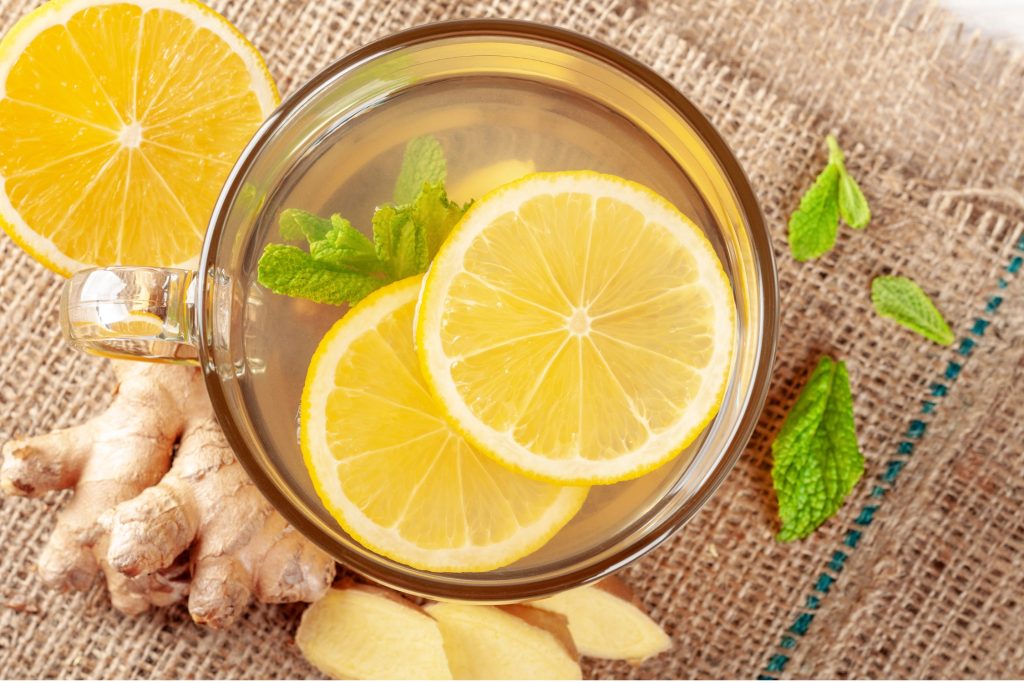
Lemon ginger tea is popular for its various health benefits, including relieving nausea, reducing pain and inflammation, and alleviating symptoms of cold and flu.
Nausea and Morning Sickness Relief
Lemon ginger tea can be highly effective in reducing nausea and morning sickness, especially during pregnancy. Ginger contains compounds like gingerol and shogaol which help soothe the stomach. Many pregnant women find relief from nausea by drinking a cup of this tea in the morning.
Its mild and soothing properties make it safe and beneficial. It’s also helpful for those experiencing nausea due to travel sickness or post-operative recovery.
Pain and Inflammation Reduction
One of the notable benefits of lemon ginger tea is its ability to reduce pain and inflammation. Ginger has natural anti-inflammatory properties, thanks to gingerol, which can help alleviate aches and cramps associated with conditions like arthritis and menstrual pain.
Lemon, being rich in vitamin C and antioxidants, can further aid in reducing inflammation. Drinking lemon ginger tea may provide relief from headaches and joint pain, making it a natural alternative to over-the-counter pain relievers.
Cold and Flu Alleviation
Lemon ginger tea is often used to alleviate symptoms of cold and flu. The tea’s warming effect can help soothe a sore throat, and its natural antiviral and antibacterial properties can assist in fighting off infections. Ginger is known to boost the immune system, while lemon provides a significant dose of vitamin C.
This combination can help reduce congestion, fever, and other uncomfortable symptoms. Drinking lemon ginger tea regularly during the cold season can be a preventive measure to keep such ailments at bay.
Side Effects and Interactions of Lemon Ginger Tea

While lemon ginger tea offers various health benefits, it can also lead to specific side effects and interact with some medications. Being aware of these potential issues can help individuals make informed decisions about their tea consumption.
Potential Adverse Reactions
Drinking lemon ginger tea can cause several side effects. Common reactions include heartburn and stomach upset due to the acidic nature of lemon and the spicy characteristics of ginger. Some people may experience diarrhea if consumed in large amounts. Another risk is bleeding, as ginger can thin the blood. Nausea could occur among people sensitive to the strong taste or smell of ginger.
Additionally, lemon ginger tea might affect blood sugar levels, which is particularly critical for people with diabetes. It may either lower or stabilize these levels, leading to unpredictable situations for diabetic patients. Overconsumption of ginger can also interfere with digestive health, leading to issues like gas or bloating.
Considerations for Chronic Conditions
For those with chronic health conditions, certain interactions need to be carefully considered. Blood thinners, such as warfarin, can have dangerous interactions with lemon ginger tea. Ginger’s blood-thinning properties could potentially enhance the effect of these medications, increasing the risk of bleeding.
Individuals with high blood pressure should monitor their intake, as the interaction between the tea and blood pressure medications could either lower or stabilize blood pressure unpredictably. Moreover, patients should be cautious about how the tea might interact with prescribed treatments for their conditions, as it could affect how well these medications work.
Patients are advised to consult with healthcare providers before adding lemon ginger tea to their diets, especially if they are undergoing treatment for any chronic condition.
Preparing and Enjoying Lemon Ginger Tea
Lemon ginger tea is simple to prepare and offers a comforting, flavorful beverage that can be enjoyed hot or cold.
Recipe:
- Ingredients: Fresh ginger (1-2 inches), 1 lemon, 4 cups water, honey (optional)
- Slice the ginger and lemon.
- In a medium pot, bring water, ginger, and lemon to a boil.
- Reduce heat and simmer for 10 minutes.
For a stronger brew, let it steep with the heat off for another 10 minutes. Strain into a mug and add honey to taste.
Preparation Tips:
- Use fresh ginger for a more robust flavor.
- Adjust the amount of honey or lemon juice based on personal preference.
- For a refreshing twist, add mint leaves.
Lemon ginger tea is an excellent choice for hydration. It is caffeine-free, making it ideal for any time of the day.
Enjoy the soothing warmth and refreshing taste of lemon ginger tea as a part of your daily routine.
Frequently Asked Questions
What are the potential digestive benefits of consuming lemon ginger tea?
Lemon ginger tea can help soothe digestive issues. Ginger contains an active ingredient called zingiber, which may reduce nausea and vomiting. This tea can also help alleviate indigestion and bloating by relaxing the gastrointestinal tract.
Can lemon ginger tea aid in weight loss efforts?
Lemon ginger tea may support weight loss. Ginger has properties that can boost metabolism and promote fat burning. Additionally, lemon contains vitamin C, which can help detoxify the body and improve digestion, potentially assisting in weight management.
How does lemon ginger tea impact overall immune system function?
Lemon ginger tea is beneficial for the immune system. Lemon is rich in vitamin C, which helps strengthen immune defenses. The antioxidants in both lemon and ginger may help fight infections and reduce inflammation.
Are there any particular health conditions that could be aggravated by lemon ginger tea consumption?
Certain health conditions might be worsened by consuming lemon ginger tea. For instance, ginger can cause heartburn or stomach upset in some individuals. People with acid reflux or ulcers should consult their healthcare provider before consuming this tea regularly.
What are the recommended amounts of lemon ginger tea for obtaining its health benefits?
Most recommendations suggest 1-2 cups per day to reap its benefits without risking side effects. Overconsumption may lead to adverse effects, such as digestive irritation.
How does lemon ginger tea interact with common medications?
Lemon ginger tea can interact with certain medications. For example, ginger may enhance blood-thinning effects, which is a concern for those on anticoagulants. Make sure to consult with a healthcare provider to ensure that drinking this tea is safe alongside any prescribed medicines.
References:
This website does not provide medical advice.
All information provided on this website, and on associated social media networks, including but not limited to texts, images, and numbers are for general information purpose only. It is not intended as medical advice and it does not include all possible precautions, side effects, or interactions that may occur. Neither NaturalLivingOnline.com nor its author/founder take responsibility for how you use this information. Statements contained on NaturalLivingOnline.com have not been evaluated by the FDA. You should conduct thorough research via multiple sources and consult your physician or qualified doctor before using any essential oil or herbal remedy. Information on NaturalLivingOnline.com must not be relied upon for medical, legal, financial or other decisions.

